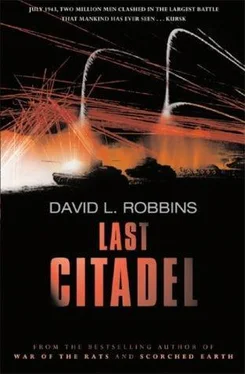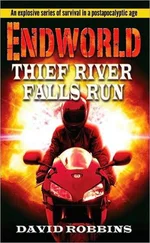‘You’re soft,’ he told his son.
‘I follow orders.’
‘You follow Communists.’
‘Stalin’s winning the war.’
Dimitri held out one veined forearm. He pointed at the blue tracks marbling the muscle. ‘You see this? This is what’s winning the war. Russian blood. Not Stalin, not Lenin. Me. You. You know what the word ‘Cossack’ means. It’s Turkish, from kazak . It means – ‘
‘Freedom, Papa, it means freedom. We’ve had this discussion.’
‘And I want to have it again.’
‘I’m not going to fight with you.’
No, thought Dimitri, it seems you’re not.
The son, born under the reign of Lenin, turned his back on his father, born under Tsar Alexander III. He took several steps with Dimitri glaring at his back.
‘When will we get our new crew?’ Dimitri called, his tone controlled, as if he were a private asking his sergeant.
Valya stopped. He did not turn or raise his head. Face me, thought Dimitri, get your fucking head up.
‘In a few days, I’m told.’
‘Well, if you’ve been told, I’m sure that’s what will happen.’
The boy’s jaw was set. Dimitri nodded at this, pleased.
‘My mother was a saint.’
Svetlana. Dead. Starved by Stalin fifteen years ago in the Ukraine along with ten million others. There she was, in Valentin’s lean Cossack face, just for an instant, defending herself on his lips. Dima, Dima, you bastard ! she’d shouted at him a thousand times; Dima, you fool , she’d laughed a thousand more.
‘Yes, she was,’ Dimitri answered.
Over the battleground of the mother and wife, father and son stood equal for a few seconds. Then she was eclipsed by the boy’s own spirit and Valya’s eyes dropped again.
‘Leave me alone,’ Dimitri told him, ‘and let me get this tank ready.’
Valentin walked away into the hip-high grass, following the tank tracks crushed there by his father.
Outside the tarpaulin, the sun refused to go down. It’s late, thought Dimitri, go away, let a man sleep. Valentin, stretched on the grass opposite him beside the tank, snored. It was a young man’s gift to sleep like that. The sun hung on with desperate last rays, waiting until the moon could take hold full in the sky.
Dimitri rolled from beneath the tarp and got to his feet. The world was more lit than he’d realized, ridiculous, he thought, so close to midnight. The moon seemed hot and urgent. Standing in the grass, in the moonshadow of a tree, Dimitri appeared to himself white and cadaverous. How can a man sleep under this son of a bitch of a moon? he wondered. Go away, all of you, everything, let a man rest.
He walked past the four tanks of his platoon, then down the line of the twelve T-34s in his company. He lit a cigarette, strolling, trailing gray haze. Hushed voices rose in the twilight. ‘Dima, can’t sleep?’ ‘Not nervous, are you, old man?’ Dimitri waved the dot of his cigarette at the good-natured taunts from under the tarpaulins, he moved through the thicket of youthful snores in the macabre light. There were forty-five tanks in his battalion, all of them parked in four rows. He walked until the signal flare went off.
The streak was green, a brilliant, crackling dot trailing smoke high into the moon’s reach. The ground shimmied under the flare’s flicker. The lighting of the world went backward, from dead to sickly, but the action around him was immediate. Emerald shadows leaped from their sleep, tarps were torn down, men teemed to their tanks. Dimitri cast away his cigarette and ran back to his tank.
This is not an attack, he thought, careering between men and waking machines. The German assault hasn’t begun yet. Even though the front line was well beyond the dim horizon, there would have been flashes of artillery fire on the rim. There would be air assaults, more flares around the 6th Army’s position awakening other divisions, more confusion, some panic. To Dimitri, this smelled of drill, another round of war games.
When he reached the General , Valentin was already standing in place behind his open hatch door. Dimitri was the last driver in their company to jump into his seat. Valentin said nothing while Dimitri cranked the engine. The tank shuddered and the diesel added its racket to the rumbling night.
Dimitri slipped on his padded cloth helmet and goggles. He plugged in the interphone cable and buckled the strap under his chin, adjusting the throat microphone in the strap over his Adam’s apple. The earphones in his helmet buzzed. Valentin’s voice said only, ‘ Test .’
‘Clear.’
Dimitri glanced at the empty chair beside him; the Degtaryev machine-gun’s pistol grip had no hand on it. This better be another drill, he thought, we’ve got no hull gunner. And beside Valentin was another empty padded seat. We’ve got no loader.
Moments later, the tank in front of Dimitri pulled forward. He did not wait for Valentin’s order to fall in, but shifted to first gear and rolled ahead, allowing ten meters to grow between the General and the next tank, the correct amount of distance when traveling in column formation. He had no idea where they were going. Their destination was Valentin’s job, the commander’s job. Dimitri looked over his shoulder and up, to see his son. The boy was folded into his seat, a map spread over his lap, a small light glowing over his head. Dust and smoke flew in the night air, mixed with pollen and torn grasses. The column moved with their running lights off, to avoid being spotted by prowling enemy night bombers. Dimitri couldn’t see the tank in front of him, so he drove the General straight into the dirty cloud that was its wake.
The column turned south. They stayed west of the Belgorod-Oboyan road, tramping up and down the rolling plain. They’d come this way five days ago, to stop at a narrow branch of the Solotino outside the village of Novoselovka. The first T-34 to cross the river bridge had cracked through the pilings and crashed on its side in the shallow water in a magnificent splash. Its crew broke some bones and the march was halted. Engineers were called up to make the bridge secure, something that should have been done weeks ago but someone missed it. Tonight, the column of tanks roared across the little span without incident. Jolting over the new-timbers, Dimitri wondered if that lead tank was still tilted beneath him in the water. Probably, he decided. But there are no kids playing on it during the daylight. The entire area along the bulge of the 250-mile-long front line had been evacuated and turned into a fortress. Every bridge was mined, a thousand of them. Every solid house of every village had a machine-gun in a window. Roaring out of Novoselovka, Dimitri could not see one light in any dwelling, not one cow or chicken along the road. Where there are no chickens, he realized, there are no Russians.
The column moved without break for two hours, coursing south over fields parallel to the Oboyan road. In that time, Valentin did not speak, but studied his maps in his command position. This was the son he had raised. A map reader, following the terrain on a sheet of paper instead of by the stars and landmarks. Dimitri’s father, Konstantin, could not read a word, let alone decipher a military map. But the old man and his horse were never lost, not on weeklong hunting trips, not when he rode across these same steppe lands beside his own son, galloping under a raised saber and the white flag of Nicholas against the tightening rule of the Communists. Konstantin had taught Dimitri how to ride the earth like a horse, follow its movements, keep himself in its stirrups. Now Dimitri listened to the soft hum of nothing in his earpieces, from a silent son and commander. Dimitri had not taught the boy well. His old father would be angry.
Читать дальше












